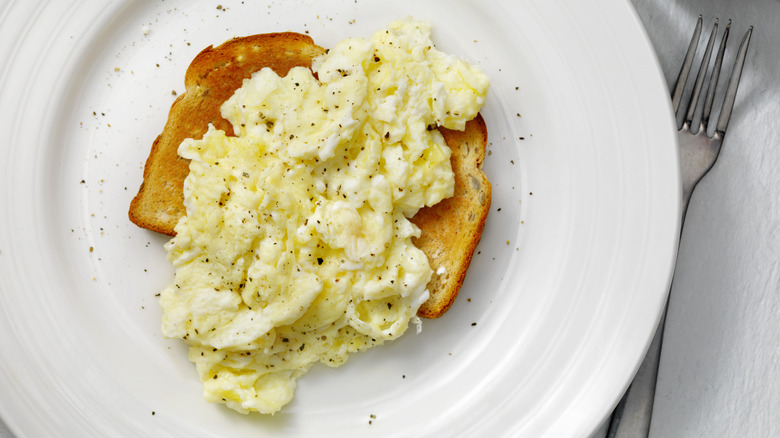Give Your Scrambled Eggs A Flavorful Twist With A Drop Of Sherry Vinegar
Scrambled eggs are the perfect breakfast dish. They're easy to prepare, have plenty of nutrients, and come together quickly in just one pan. Plus, eggs have a mild flavor, which means you can jazz them up in a number of ways. Add chopped veggies, cheese, or even up the ante with a splash of sherry vinegar — though unconventional, it will give your eggs a unique flavor profile.
Scrambled eggs are rich, especially when they're prepared with butter or a little whole milk to make them extra fluffy. In this case, a small amount of vinegar adds just the right amount of acidity to balance out that decadent flavor. Don't overdo it, though; balance is key here, so start with just a small amount of sherry vinegar. You can always add more to taste, but if you add too much, your balanced eggs will turn into a pungent, unpleasant dish and might not firm up properly.
Your eggs need a touch of sherry vinegar
Next time you're whipping up eggs, sherry vinegar is a must-try, Insider reports. "Sherry vinegar has a distinct color, taste, and aroma that cuts through the richness of scrambled eggs," the outlet proclaimed. Eggs and vinegar are actually a relatively well-known pairing in France, though the vinegar is often added as a topping to a fried egg.
Vinegar is commonly used in other egg preparation methods, as well, so it's not as unusual as it sounds. You've probably heard that adding a few drops of vinegar to boiling water will help better prepare hard-boiled or poached eggs. That's because vinegar helps break down the shells, making hard-boiled eggs easier to peel, in addition to imparting a bit of flavor. As for poached eggs, flavor is a factor as well as the eggs' shape; vinegar actually helps the eggs hold their signature rounded shape as they cook.
Can you use other types of vinegar in eggs?
Sherry vinegar isn't the only option when making scrambled eggs, but it's a strong option because it's made from sherry wine, or grapes, which gives it a more balanced flavor than other types of vinegar. However, if you want to understand how the vinegar adds flavor, you can use what you have on hand; apple cider vinegar or red wine vinegar should also work well.
Although vinegar doesn't necessarily expire, using vinegar that is far beyond its expiration date could alter the flavor. The acidic flavor you're expecting could be dulled, meaning it won't add the sharp notes that you're looking for.
As far as how much vinegar to add, a little goes a long way. If you're just cooking one egg, don't add more than a couple of drops. Even a teaspoon is too much; try starting with a quarter teaspoon, and work your way up as needed depending on your own flavor preferences.


